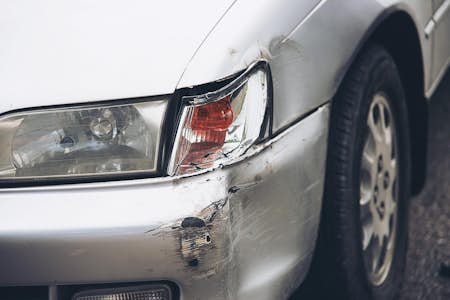You don’t need to fret over getting car insurance as you turn 80. Over-80s drivers can find the same level of cover as other motorists. You don’t even need any fancy paperwork or specialist insurance. The process is the same:
- Find an insurance company.
- Get a quote.
- Review the policy's terms and conditions.
- Buy the policy.
But there are a few things you must know about, especially if you want to keep the cost of your insurance down.
Do you need extra documents to get car insurance at 80?
No. Generally, finding car insurance remains similar regardless of age. If you’re looking for car insurance and you’re 80 or over, you don’t need to fill out any extra paperwork, and the range of providers catering to older people is good today.
So grab your driving licence, car registration number, and any no-claims discount details you have. You should also check your annual mileage and whether you’ve made previous insurance claims. If you already have a car insurance policy, prepare the policy or reference number.
You can then use comparison websites or contact the provider directly for a quote.
Do you need to renew your driver’s licence when you turn 80?
No; however, you should already be renewing your licence every three years after turning 70. But there are no new rules or requirements to adhere to when you reach 80.
Renewing your driver’s licence at 70 or over is free. You can do so with the DVLA, online or by post. Renewing is easy, so you don’t need to use any special websites that do it for you. These services often charge a high fee for something you can easily do in a few minutes.
Can your eyesight stop you from getting car insurance at 80?
It could, but that’s true regardless of your age. To legally drive, you must:
- Be able to read a modern number plate from 20 metres away (with glasses or contact lenses). If you want to test this, walk to a car park and see if you can read a number plate around five car lengths away.
- Have a visual acuity of at least decimal 0.5 on the Snellen scale. You can find this out with an eye test.
- Have an adequate field of vision, which means being able to see a lot without moving your head too much. Your optician can tell you more about this during your test.
You can talk to your optician about eye tests or if you’re worried about your eyesight in general. NHS eye tests are free to everyone after 60.
Do you need to report pre-existing medical conditions when you’re over 80?
Yes, you must report certain medical conditions or disabilities. You need to do so even before you’re 80. Failing to disclose a medical condition that affects your driving could lead to a fine of up to £1,000. If you’re in an accident resulting from your condition, you could even be banned from driving.
You can find a list of medical conditions and guidance on the required procedures on the GOV.UK website. Please contact DVLA if your condition is not on the list.
Declaring a medical condition doesn't automatically result in a driving ban. The DVLA may require you to undergo a medical examination to evaluate the condition's impact on your driving. In certain situations, you may need to modify your car, for example, adding cushions or swivel seats to help you get in and out. Let your insurance provider know if you make any adaptations to your car.
Please note that if you’re diagnosed with a new medical condition, you must report it to your car insurance provider. This ensures your policy isn’t invalidated if you get into an accident later.
Will your medical condition hike up car insurance quotes?
It could, as some insurance companies charge higher premiums for people with a medical condition. Under the Equalities Act 2010, insurers can charge higher premiums if they believe your condition increases your chances of causing an accident. However, they must inform you of the reasons.
If you have an adapted vehicle, it could also lead to higher insurance premiums. The specialist vehicles may require extra repairs in case of an accident.
Can insurers refuse to provide motor insurance because you’re over 80?
The sad reality is that insurance companies can refuse to provide service. Generally speaking, insurance providers cannot discriminate against you, but some exceptions exist for age or disability.
Some insurance companies are outright about this and state clearly on their website if their car insurance has an upper age limit. However, some companies still claim to provide car insurance for those over 80 but might refuse you after applying. An Age UK study from 2012 showed 21% of people aged 80 had their car insurance application denied due to old age.
It’s not always a case of discrimination. An insurer might sometimes choose not to quote instead of providing you with a quote for £12,000 a year. For some firms, it’s better to be a company that doesn’t cover older drivers rather than one that’s ripping them off.
The UK Government renewed its signposting agreement with the insurance industry in 2023 to help with the problem. The agreement means insurers should signpost customers forward if they can’t provide insurance to them. They should direct you to another provider or the British Insurance Brokers’ Association’s (BIBA) ‘Find Insurance Service’.
Contact the Financial Conduct Authority (FCA) for complaints about your insurance.
Can over 80s access the same policies as younger demographics?
Your car insurance coverage at 80 is the same as car insurance policies for other age groups. Your choice of cover is down to your needs, and you can choose between:
- Third-party.
- Third-party, fire and theft.
- Comprehensive cover.
You can also opt for extra options such as a breakdown cover, windscreen cover, a courtesy car, motor legal protection, and vandalism cover. Different providers have different extras, so look around to find what you need.
Does car insurance cost more for drivers over 80?
Yes, it can be more expensive. Car insurance premiums decrease as you age but start to creep back up once you close in on 80. In 2021, NimbleFins data showed the average cost for a 65-year-old was £491 but jumped to £752 for 75-year-olds.
Insurers view older drivers as more of a risk on the road, often due to increasing health conditions. There’s also evidence that drivers aged 75 to 85 are more at risk of collisions, with the risks growing as you get older.
Due to these risk factors, car insurance premiums may rise. However, other factors impact the cost, too. Your health, the car you drive and how much you drive can all bring down the cost of your insurance (or increase it!).
Is car insurance cheaper for women over 80?
Car insurance for women was cheaper in the past, as insurers deemed men to be at a higher risk of causing accidents than women. However, legislation by the European Court of Justice ended this practice, and insurers can’t charge different premiums due to gender.
How to find cheaper car insurance when you’re over 80
The trick to finding the best car insurance deals is the same, regardless of your age. You should compare different policies and shop around to find a policy that fits your needs. You can also lower the cost by increasing the voluntary excess, reducing your mileage and picking a car from a low-cost insurance group. Many insurers also offer no claims bonus that can bring the cost down.
Can telematics lower your car insurance premium?
Yes, they can. Telematics show your car insurance company how you drive. They connect a tracker, sometimes called a black box, or another type of data-logging tool to your vehicle. The data will show your driving ability and provide information to your insurance company on what type of driver you are.
The data could lower your insurance premium if you're a low-risk driver or don't drive very often. For example, your premium could decrease if you're only behind the wheel a few times a week. This is because you'll be spending less time on the road. You will, therefore, be putting yourself at a lower risk of being involved in an accident.
Can you lower car insurance costs with an advanced driving course?
Some insurers might offer a discount if you take an advanced driving course. The courses can improve your driving skills in bad weather or at night, especially if you don’t drive often. Widely recognised courses include the Pass Plus Scheme and AA’s advanced driving courses.
Keep in mind that the discount is not guaranteed and varies depending on the insurer. It’s worth checking if your insurers offer them before signing up!
What is the best over-80s car insurance cover?
The best over-80s car insurance policy depends on your needs. Opting for comprehensive car insurance rather than a third-party fire and theft policy may be more beneficial. It's also worth considering the optional extras such as enhanced legal protection, breakdown cover, or a replacement car in case of an accident.
Compare car insurance quotes using comparison sites to ensure you get the best deal. While you don't need any additional paperwork, renewing your car licence regularly is important to ensure you're legally covered. With a little research, finding the right car insurance policy can be easy and give you peace of mind.
Image Credit: roro93380 at Pixabay







